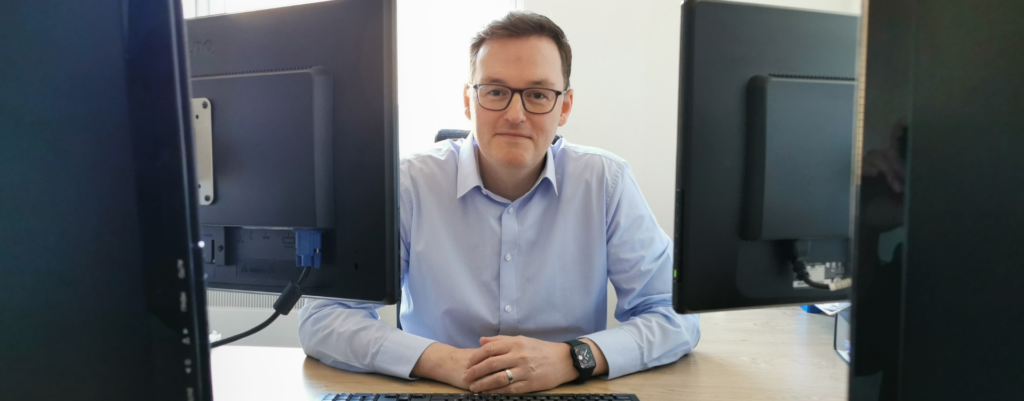
By Robbie Ross, CSO, Converged Communications Solutions.
Listen to this article
For 10 years, before I joined the cyber security community, I was a Counter Terrorism Security Advisor (CTSA) with Police Scotland. The role of a CTSA is to provide protective and counter terrorism security advice to all businesses, both public and private. I found myself engaging with a whole host of organisations from energy firms and laboratories to shopping centres and companies that provide vital functions to the running of the UK.
Assuming that cyber security is already being managed (if not, please feel free to get in touch), ensuring the physical security of your business should also be a priority. While the digital realm is often a primary focus for security efforts, physical vulnerabilities can also pose significant risks.
When you think about physical security, what springs to mind? For most it’ll be strong robust doors and locks put in place to prevent unauthorised access to your building, both of which are essential. However, getting your physical security right provides many more benefits to your organisation.
Asset protection
Physical security measures help safeguard a business’s valuable assets, including equipment, inventory, cash, intellectual property, and sensitive information. By protecting physical assets, businesses can prevent theft, damage, or unauthorised access, minimizing financial losses and operational disruptions.
Employee and customer safety
Physical security measures create a safe environment for employees, customers, and visitors. This fosters a sense of security and well-being, which can improve employee morale, productivity, and customer trust. It also reduces the risk of workplace accidents or injuries.
Protection against unauthorised access
Unauthorised access is not just about people trying to get into your building. It is also about restricting access to areas where sensitive information is stored, preventing vandalism or other malicious activity. Physical security measures like access controls, surveillance and intrusion detection systems act as deterrents and provide barriers against such unauthorised access.
Compliance with regulations & legal requirements
Depending on your industry and geographical location, businesses may be subject to various security regulations and legal requirements. Implementing physical security measures ensures compliance with these regulations, avoiding penalties, lawsuits, or reputational damage. This was very much the case for the organisations I dealt with as a CTSA.
Continuity of operations
Disruptions to business operations due to physical security breaches, such as theft, vandalism, or natural disasters, can have severe consequences. Physical security measures help mitigate these risks, allowing businesses to maintain continuity of operations, minimise downtime, and quickly recover from incidents.
Reputation and customer trust
A business that demonstrates a strong commitment to physical security sends a message to customers and stakeholders that it takes the protection of their interests seriously. This fosters trust, enhances the business’s reputation, and can attract and retain customers who prioritise security in their choices of vendors or service providers.
Integration with cyber security
Physical security and cyber security are interconnected. Physical breaches, such as unauthorised access to servers or networking equipment, can lead to data breaches and compromise sensitive information. By implementing physical security measures, businesses can complement their cyber security efforts and create a layered defence against potential threats.
Key considerations
Having read about the benefits of physical security, here are some key tactical considerations for your business:
- Access control: Implement robust access control measures to restrict entry to authorised personnel only. This can be as simple as a key card security system, but can include security guards, biometric authentication, or surveillance systems.
- Perimeter security: Secure the premises by implementing physical barriers like fences, gates, or barriers to control and monitor access to your property. Consider installing security cameras and adequate lighting to deter and detect unauthorised activities.
- Alarms and monitoring: Install intruder detection and alarm systems that can alert key personnel or security agencies in case of unauthorised entry or suspicious activities. Monitoring systems can include CCTV cameras, motion sensors, or glass-break detectors.
- Secure storage: If your business handles valuable assets or sensitive information, it’s important to have secure storage areas with restricted access. Safes, vaults, or lockable cabinets can help protect physical assets.
- Personnel training: Educate employees on the importance of physical security and implement protocols for reporting suspicious activities or potential security breaches. Conduct regular training sessions on security procedures, emergency response plans, and the proper use of security systems.
- Visitor management: Establish visitor registration procedures and issue identification badges to visitors or contractors. Implement processes for escorting visitors in restricted areas and ensure their departure is properly documented.
- Data and equipment protection: Physically secure servers, data centres, and networking equipment to prevent unauthorised access, theft, or tampering. Use appropriate environmental controls, such as fire suppression systems and temperature monitoring, to safeguard critical infrastructure.
- Disaster preparedness: Develop and implement contingency plans to handle emergencies, natural disasters, or power outages. This may include backup power supplies, emergency evacuation plans, or off-site data backups.
- Regular audits and reviews: Conduct periodic assessments of your physical security measures to identify any weaknesses or vulnerabilities. Regularly review and update security policies and procedures based on evolving threats or changing business requirements.
Remember, the specific physical security measures you require will vary depending on the nature of your business, its size, and the level of risk involved.
If you haven’t reviewed your physical security recently, then maybe now is the time to look at it again. My colleagues at Scot-Tech Fire and Security, a Converged group company, are available to offer advice. They are specialist installers of high-technology fire alarm, security, entry, TV, data communication and other electronic systems. You can contact the team on 01224 573601 or at info@stfs.co.uk. For more information about the services Scot-Tech Fire and Security offer visit www.stfs.co.uk.

